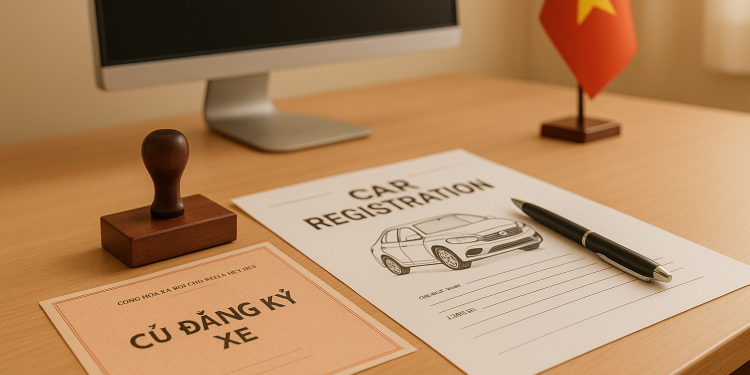In Vietnam, registering your car in 2025 involves stricter rules and updated processes. Here’s what you need to know upfront:
- Key Changes for 2025: Electric vehicle owners benefit from a fee exemption until 28 February 2027 (Decree 51/2025/ND-CP). New regulations under Decree 166 and Circular 47 require vehicles to meet higher safety and compliance standards.
- Required Documents: Prepare your ID, proof of ownership, technical inspection certificate, tax receipt, and insurance. Foreigners need valid visas or residence cards, with certified translations for foreign documents.
- Eligibility: Vietnamese citizens aged 18+ can register vehicles. Foreigners need long-term visas or residence cards. Businesses and special groups (e.g., diplomats) have specific requirements.
- Process Overview: Complete a technical inspection (if required), submit documents through the Public Service Portal or in person, pay fees, and receive your licence plates within 2–7 working days.
- Fees: Costs vary by location and vehicle type. Urban areas typically have higher fees, while EVs enjoy reduced or waived fees. Payments can be made online, in person, or via authorized banks.
Pro Tip: Ensure your vehicle meets safety and environmental standards, resolve traffic violations, and verify all documents to avoid delays or rejections.
This guide simplifies the steps, so you can navigate the process confidently and avoid common pitfalls.
Thủ tục đăng ký – Mua xe mới đăng ký hết bao nhiêu phí sau khi sáp nhập tỉnh nên tự đăng ký không
Required Documents and Eligibility
Getting your car registered in Vietnam requires thorough preparation. Even a single missing document can disrupt the process, so make sure everything is complete and accurate before you begin. Double-check your paperwork to avoid unnecessary delays.
Required Documents for Registration
To register a vehicle, you’ll need several key documents to confirm your identity, prove ownership, and ensure compliance with regulations. Each document plays a specific role, and all must be valid and up-to-date.
Identity and Legal Documents:
For Vietnamese citizens, you’ll need your Citizen Identity Card (CCCD) or Identity Card. Foreigners must provide their passport along with a valid visa or temporary residence card. If someone else is handling the registration on your behalf, a notarised power of attorney is required to authorise them.
Vehicle Ownership and Technical Documentation:
This includes the Certificate of Vehicle Origin or import customs declaration, which proves the vehicle’s legal entry into Vietnam. A technical safety and environmental protection certificate is also required to confirm the vehicle meets local standards – this document must be obtained from an authorised inspection centre before registration. Additionally, you’ll need the vehicle purchase invoice or transfer contract, which outlines the transaction details and purchase price.
Financial and Insurance Requirements:
You must provide the special consumption tax receipt as proof of tax payment. Also, compulsory civil liability insurance is mandatory for all vehicles registered in Vietnam.
Make sure to submit original documents; the office will make copies and return the originals to you. If any documents are in a foreign language, they must be accompanied by certified Vietnamese translations prepared by an authorised service.
Once you’ve gathered all the necessary paperwork, your eligibility to register a car will depend on your specific circumstances.
Who Can Register a Car
Eligibility for car registration in Vietnam varies based on your citizenship and residency status.
Vietnamese Citizens:
The process is straightforward for Vietnamese citizens. Anyone aged 18 or older can register a vehicle in their name, with no additional residency or income conditions.
Foreign Residents:
Foreigners with valid long-term visas, such as work permits or temporary residence cards, are eligible to register vehicles. Tourists on short-term visas, however, must go through authorised dealerships or have a Vietnamese sponsor handle the registration. Ensure your visa or residence permit is valid for at least six months to qualify.
Corporate Registration:
Businesses operating in Vietnam can register vehicles in the company name. Required documents include the company’s business licence, tax identification number, and proof of the legal representative’s authority to act on behalf of the company.
Special Circumstances:
Certain groups have unique registration processes. For example, diplomatic personnel handle their registrations through their respective embassies, while staff of international organisations may have exemptions or special requirements. Students with long-term study visas are typically eligible, provided their visa duration meets the minimum threshold.
Regardless of the applicant type, the registering individual must be at least 18 years old. For minors who own vehicles, a legal guardian or parent meeting the eligibility criteria must complete the registration on their behalf.
Registration Process Steps
After gathering all the necessary documents and confirming your eligibility, the registration process is fairly straightforward. For new vehicle registrations, the process typically takes two working days once all documents are submitted. Re-issuance of registrations, however, can take up to seven working days. An important step before proceeding is ensuring your vehicle complies with required safety and environmental standards.
Technical Inspection and Certification
Check with local authorities to see if your vehicle requires a technical inspection. This is often necessary for certain imported or used vehicles to verify they meet safety and environmental requirements. If an inspection is needed, make sure to secure the certification as it will be a key part of your application.
Document Submission and Fee Payment
Submit your complete application either in person or through the Public Service Portal or VNeID app. The process officially begins once all required documents and fees are submitted accurately. Ensure everything is in order to avoid delays, as the processing period for new registrations is two working days.
Getting Your Licence Plates
Once your application is approved, you can collect your official licence plates and registration certificate. In some provinces, temporary plates are issued immediately, while permanent plates are provided within two working days. For re-issuances, the process may take up to seven working days.
sbb-itb-1ccdff5
Registration Fees and Payment Methods
Planning for car registration in Vietnam involves understanding the costs involved and how to pay them. Fees can vary depending on your location, the type of vehicle, and its engine capacity. There are also incentives available, such as reduced rates for electric vehicles. Below, we’ll break down the fee structure for 2025 and explore the payment methods you can use.
2025 Fee Structure
Registration fees differ significantly between urban and rural areas. Urban centers tend to have higher charges, often reflecting the specifications of vehicles registered there. On the other hand, rural and provincial areas generally offer lower rates. Some provinces are also promoting the use of electric vehicles by offering discounted registration fees. If you’re in a hurry, be prepared for possible extra charges for expedited processing. For the most precise and up-to-date information, check with your local Department of Transport or visit the official registration website.
How and Where to Pay
Once you’ve figured out the fees, paying them is relatively simple. You have several options to choose from:
- In-person payments: Most provincial Department of Transport offices accept payments during their operating hours. You can pay using cash or a bank card.
- Bank payments: Certain authorized banks allow you to settle registration fees at their branches. Just bring your application reference number and identification documents.
- Digital payments: Government portals and mobile apps support online banking and e-wallet transactions, offering a more convenient way to pay. In some areas, mobile payment services may even visit remote locations on a set schedule.
With these options, you can select the method that best suits your circumstances, making the process as hassle-free as possible.
Tips for Smooth Registration
To avoid hiccups during your vehicle registration, start by ensuring your vehicle passes its technical inspection. A common reason for inspection failures is brake-related problems, such as misalignment or reduced performance. Since properly functioning brakes are crucial, it’s wise to address any issues as soon as they arise. Work with a certified technician to resolve these problems quickly, and you’ll keep your registration process moving without unnecessary delays.
Conclusion
Registering your car in Vietnam in 2025 comes with tighter rules and demands meticulous attention to updated laws and complete paperwork. With the introduction of Decree 166 and Circular 47, effective from 1 January 2025, the process has become more rigorous, requiring full compliance to pass vehicle inspections smoothly.
The Vietnam Register has already highlighted key challenges:
In January 2025, the Vietnam Register warned that many vehicles might face rejection for inspection due to non-compliance with stricter standards under Decree 166 and Circular 47, effective January 1, 2025. Common issues leading to refusal included unaddressed traffic violations, modified vehicles without updated registrations, mismatches in vehicle color compared to registration details, and commercial use license plates lacking proper documentation.
Being well-prepared is the key to avoiding potential roadblocks. Ensure your vehicle meets all technical requirements, resolve any outstanding traffic violations, and verify that all documents align with the latest standards. Special attention should be given to vehicle modifications, which now require updated certificates from certified inspection centers under the new regulations.
Additionally, understanding the fee structure ahead of time can help you avoid unexpected costs. Familiarize yourself with Decree 90/2023/ND-CP, which took effect in February 2024, to ensure you’re ready to meet all financial obligations. With these stricter rules in place, thorough preparation is your best defense against delays, penalties, or rejections during the 2025 registration process.
FAQs
What safety and compliance standards must vehicles meet under Vietnam’s new Decree 166 and Circular 47?
Under Vietnam’s Decree 166 and Circular 47, vehicles must now adhere to updated requirements focused on safety and emissions. These regulations aim to enhance road safety while addressing environmental concerns.
To meet these standards, vehicles need to:
- Successfully complete emissions tests to align with environmental guidelines.
- Pass thorough safety inspections, which include checks on brakes, lights, and other essential systems.
- Fulfill stricter conditions for registration and road use.
Inspection centers are also operating under tighter rules to ensure vehicles meet these updated requirements. Vehicle owners should prepare carefully – this means addressing potential issues in advance to avoid delays or unexpected expenses during the registration process.
How can electric vehicle owners benefit from the registration fee exemption available until February 2027?
Electric vehicle (EV) owners in Vietnam have the chance to enjoy a registration fee exemption if they register their vehicles before 28 February 2027. This initiative aims to promote the use of eco-friendly vehicles across the country.
To make the most of this exemption, gather all necessary documents, including proof of EV purchase and your personal identification. Submit these at your nearest vehicle registration office. Registering on time not only helps you save money but also supports the push for a cleaner, more sustainable environment in Vietnam.
Can foreigners with a short-term visa register a car in Vietnam? What steps should they follow?
Foreigners visiting Vietnam on a short-term visa can register a car, but the process tends to be more complicated than it is for long-term residents. Here’s a quick overview of what you’ll need to navigate:
- Eligibility: Car registration is often linked to your residency status. If you’re on a short-term visa, you might need extra paperwork or even a local sponsor to move forward.
- Documents You’ll Need: Make sure to gather your valid passport, visa details, proof of temporary residence in Vietnam, and any other documents required by local authorities.
- Where to Start: Head to your local Department of Transport or a vehicle registration office. They’ll provide specific guidance based on the type of visa you hold and how long it’s valid.
If this sounds overwhelming, you might want to consult with a legal or registration expert. They can help you navigate the system and ensure you’re meeting all the local requirements.




